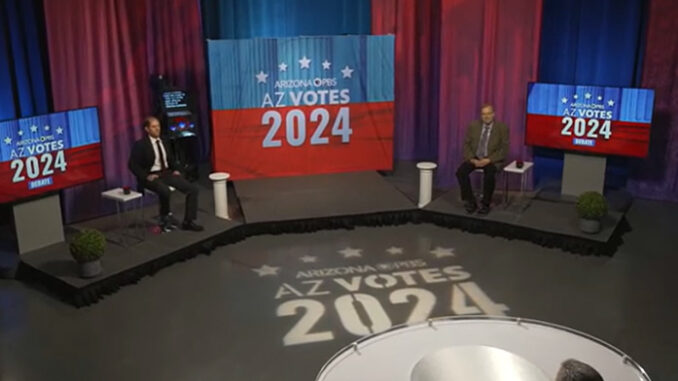
by Daniel Stefanski | Jun 27, 2024 | News
By Daniel Stefanski |
Thanks to a veto from the governor, Arizona’s attempt to find solutions for the future of its groundwater supply was marked ‘incomplete’ following the conclusion of the state’s legislative session.
Last week, Governor Katie Hobbs vetoed multiple pieces of legislation pertaining to the vital issue of water in the state of Arizona, while signing a series of those bills.
The most contentious of the latest round of vetoes appeared to be SB 1172, which would have “allow[ed] a person who owns land with an irrigation grandfathered right within an active management area to permanently retire the land from irrigation use and to retain a physical availability credit” – among other things, according to the purpose from the Arizona State Senate. The bill was sponsored by Senate President Pro Tempore T.J. Shope.
Senate President Warren Petersen was extremely disappointed in the governor’s veto of the proposal. He issued a statement over the past weekend, saying, “It’s incredibly disappointing the Governor did not sign SB 1172. Although we engaged her office on this proposal in January, they waited until May to do their due diligence and reneged last minute on an agreement. Her administration dropped the ball, and homebuyers will be the ones losing out because of her inaction.”
Petersen did note that Hobbs had signed three other groundwater-related bills, though he said that those proposals were meant to align with SB 1172 to have the maximum impact for the state. He added, “Three bills to increase housing supply while reducing groundwater pumping in Arizona, sponsored by Senate Leadership, were signed into law. All three measures transition higher-water-use land to lower-water- use housing developments through voluntary programs. While it was important for the state to look for new supplies, we get an equal benefit from reducing the demand on our aquafers. This legislation will allow Arizona to both conserve and grow. However, these bills were part of a package of four that would have made a far greater impact had they all been signed.”
In explaining why she had vetoed SB 1172, Hobbs wrote, “The concept at the core of this bill – conversion of agricultural lands to lower water use development – is a policy that has broad potential benefits and is one that my Administration supports. However, it is critical that the legislation be carefully crafted to ensure that the water conservation savings and consumer protections are guaranteed. It is clear that the unique data among Arizona’s Active Management Areas (AMAs) does not support universal adoption of this program across all four of the state’s initial AMAs (Phoenix, Pinal, Prescott, and Tucson), and that more time is needed to develop this concept in collaboration with stakeholders and lawmakers to ensure the legislation is crafted appropriately.”
The governor said that she “remain[s] committed to these discussions and finding a path forward to responsibly enact this concept.”
At the end of her veto letter to Arizona Legislative leadership, Hobbs highlighted that she had signed three water-related bills. She said, “While more work needs to be done on the ‘ag-to-urban’ legislation, I have signed several key pieces of legislation that promote responsible development and continued sustainable growth, including SB 1081, SB 1181, and SB 1242.”
Those bills were sponsored by Senators Sine Kerr, Petersen, and Shope.
Daniel Stefanski is a reporter for AZ Free News. You can send him news tips using this link.

by Matthew Holloway | Jun 26, 2024 | News
By Matthew Holloway |
After an alleged error cost the Republican Party’s favored candidate for Maricopa County Recorder the chance to participate in a televised debate, Arizona PBS is reportedly trying to make amends with Arizona State Rep. Justin Heap and his supporters.
As reported by The Arizona Daily Independent, the June 11 debate made headlines for all the wrong reasons when just two of the three candidates in the GOP Primary were invited, namely Maricopa County Recorder Stephen Richer and Don Hiatt. Heap’s absence was notable, public, and embarrassing for the public broadcaster.
Both Richer and Hiatt capitalized on the State Representative’s absence, taking rhetorical shots at Heap and moderator and “Arizona Horizon” host Ted Simons. Simons, who severs as Managing Editor of the platform, failed to acknowledge the error before the debate commenced.
Sources near the Heap campaign told ADI that they weren’t contacted by Arizona PBS until an hour before the event was to take place. Heap himself only became aware of it after seeing it on Richer’s X feed. Producers from Arizona PBS asked at 3PM on the 11th if he could get to the studio by 4PM… from East Mesa… in rush-hour. He replied that he could get there by 4:15PM at the earliest, and Arizona PBS informed him that would be too late.
It wasn’t until later that a request was found emailed to Heap’s official legislative email account. And had he replied to it, political consultants advised, he could be prosecuted for violating state law by using public resources for a partisan campaign.
After contacting Heap with a formal apology, Arizona PBS will air a one-on-one interview with Heap Thursday at 5 PM, an hour before the CNN Presidential Debate. In a letter to Heap, Arizona PBS political news producer, Grace Provenzano, apologized to the candidate.
In the letter obtained by the Independent, Provenzano wrote, “I want to apologize, once again, for our failure to reach you in a timely fashion in advance of the Maricopa County Recorder debate event yesterday. We know that it placed you and your campaign at a disadvantage and for that we are truly sorry.
In order to provide equitable airtime, we would like to schedule a one-on-one interview with you and Horizon host Ted Simons to offer you the opportunity to discuss your campaign platform and issues for our viewers. The interview would be pre-taped to air during the regular broadcast of Arizona Horizon the same day it is recorded. We would like to schedule the on-set interview as soon as possible so it can be seen prior to the beginning of the early primary voting.”
The outlet reported that the interview will be aired Thursday, June 27 at 5 PM.
In a post to X, Heap answered his opponents’ comments on his absence from the debate, writing in part, “The desperation from my opponents & their supporters is just embarrassing at this point They’re laughably trying to claim I’m too ‘scared’ to debate them in the government-subsidized PBS debate. Let’s clear something up, we’ve already debated once, and I won easily. We also have a Clean Elections Debate coming up. In fact, tonight’s debate is yet another example why we shouldn’t have state-subsidized media outlets like PBS. Their incompetence is so glaring that they couldn’t even manage to properly contact me or my campaign about the debate. …or maybe they just wanted to help their preferred Democrat-friendly candidates. Whatever the reason, it’s PBS with their total of ~53 viewers. FWIW, I made a good faith effort to rearrange my schedule and attend; however, it simply wasn’t possible without disrespecting the voters who had already made plans to come and meet with me about my plans for the Recorder’s office.”
Heap would later participate in the forum presented by the Citizens Clean Elections Commission on June 24 and made serious accusation against incumbent Stephen Richer saying that election rules were not followed and that Arizonans have a right to be skeptical about election results. He said that legal safeguards weren’t followed according to 12News and that the signature verification process for mail-in ballots was “inadequate.”
“I do not trust the system as it is currently being operated,” Heap added.
Matthew Holloway is a senior reporter for AZ Free News. Follow him on X for his latest stories, or email tips to Matthew@azfreenews.com.

by Matthew Holloway | Jun 26, 2024 | News
By Matthew Holloway |
The Goldwater Institute, acting on behalf of Former Scottsdale Mayor Jim Lane, local activist Susan Wood, and AZGOP Member-at-Large Yvonne Cahill (CD1) filed a lawsuit in Maricopa County Superior Court against the city of Scottsdale on June 18. In the complaint, the plaintiffs allege that the city is mischaracterizing a proposed new sales tax set to be voted on by the public in November with “objectively false or misleading information.”
According to court documents, the Goldwater Institute and the plaintiffs allege that the proposed tax’s “titles and tagline text are misleading, obscure the principle provisions of the measure, and constitute a ‘bait and switch.’” They go on to explain, “The Resolution is deceptive and inherently misleading, and fundamentally unfair.”
The controversy has arisen from a 0.2% Land Acquisition Tax that was approved in 1995 which is set to expire no later than June 30, 2025, and another in 2004 at 0.15% which funded the land purchase and construction of trailheads in the McDowell Sonoran Preserve respectively and a newly proposed 0.15% sales tax that would last for 30 years to provide funds for city parks.
In the 2025 Scottsdale 0.15% Sales Tax: Questions and Answers, the new tax description claims, “The ballot proposal would replace and reduce an expiring 0.20% city sales tax with a 0.15% sales tax to provide funds solely for capital replacements and improvements at city parks and recreational facilities and additional maintenance, preservation and protection, including police and fire protection, of city parks and the McDowell Sonoran Preserve. This tax would expire after 30 years.”
As the lawsuit notes, “the New Parks & Rec Tax does not, and cannot, ‘replace’ the Land Acquisition Tax that was scheduled to expire already. And likewise, the New Parks & Rec Tax “does not, and cannot, ‘reduce’ the current Land Acquisition Tax,” which without any intervention would already be eliminated as scheduled.
The City wrote that the new tax, which it calls a “replacement tax,” would provide:
- 51% for capital asset replacements and improvements to aged Indian Bend Wash parks and other citywide parks (see further discussion of capital replacements and improvements below)
- 14% for increased citywide park maintenance including additional maintenance workers and contracts to enhance park maintenance
- 7% for the Police Park Ranger program including additional resources for enforcement and education to provide better safety and security for city parks and the Preserve.
- 18% to increase maintenance, protection, and care for the McDowell Sonoran Preserve and its desert plants and wildlife, including trail and trailhead maintenance; protecting wildlife habitat; assessing and protecting archaeological, ecological, and cultural resources; and removing invasive plants to reduce wildfire risk (known as fire fuel mitigation)
- 10% for the Fire Department wildland fire fuel mitigation program with additional resources to remove/reduce overgrown plants and weeds around the Preserve and in city open spaces that pose ongoing wildfire risk during dry summer months, and additional Fire Department resources including technical rescue teams for citywide parks and the Preserve.
Goldwater Institute spokesman Joe Seyton told the Daily Independent, “They are deceiving voters because they are claiming a tax increase is actually a tax reduction, but what they are not saying is that voters will pay a lower sales tax if they vote no than if they vote yes.” He added, “Arizona law prohibits ballot measures from communicating information that is objectively false or misleading. It’s a bait and switch.”
In a statement published by the Goldwater Institute Cahill said, “Our own city leaders are deceiving taxpayers so that we’ll vote to raise taxes on ourselves. We deserve honesty from our local officials—especially when it comes to the money hardworking Arizonans are required to fork over to the government.”
Speaking with The Scottsdale Progress, Mayor David Ortega lashed out at his predecessor saying, “It is sad that former Mayor Jim Lane, who saturated our city with 23,689 apartments during his tenure, now tries to stop citizen-driven renewal of our 48 city parks, the Green Belt and protection of the McDowell Sonoran Preserve.” He continued, “Adding new Police, Fire and Park Ranger personnel for our safety is also a key element of the ballot measure. In Scottsdale, we value our treasured open space legacy, and commitment to pass them on in great shape to future generations.”
The mayor continued, “Lane and opponents failed to show up during months of deliberations, so we will see them in court.”
Matthew Holloway is a senior reporter for AZ Free News. Follow him on X for his latest stories, or email tips to Matthew@azfreenews.com.

by Staff Reporter | Jun 26, 2024 | News
By Staff Reporter |
On Monday, an Arizona court ruled that government “prevailing wage” mandates for businesses were unlawful.
The Maricopa County Superior Court issued a ruling against the cities of Phoenix and Tucson concerning their prevailing wage ordinances, which required contractors on public works to pay its workers according to city and federal rate determinations. The Department of Labor defines prevailing wage as that average wage paid to similarly employed workers in a specific occupation in that area of intended employment.
The Maricopa County Superior Court agreed that state law (A.R.S. § 34-321(B)) prohibited any city from enacting such prevailing wage ordinances as the cities of Phoenix and Tucson had done in January.
“This Prevailing Wage Statute, by its plain language, prohibits any Arizona political subdivision, such as the City of Phoenix and the City of Tucson, from enacting an ordinance that requires contractors and subcontractors to pay their workers less than the prevailing rate of wages. Nevertheless, both cities did just that on January 9, 2024,” read the ruling.
Phoenix Ordinance G-7217 and Tucson Ordinance No. 12066 required city contractors or subcontractors under a contract with an aggregate value of $4 million or more and $2 million or more, respectively, to pay workers not less than the prevailing wage rate for the same class and kind of work in the Phoenix metropolitan area. Both cities required certain record keeping and instilled penalties for violations including contract rescission, disqualification from future city contracts, and liquidated damages up to three times the wages owed.
Yet, the cities argued that their ordinances were protected under Proposition 202, or the Raise the Minimum Wage for Working Arizonans Act. The cities claimed that the act functioned under the doctrine of implied repeal: since the act and state law were inconsistent, the act took precedence since it came after state law. The superior court rejected that interpretation, since the act itself didn’t address the term prevailing wage, and there remained definable differences between prevailing wage and minimum wage.
“A prevailing wage ordinance is not a minimum wage law, and the Minimum Wage Law did not impliedly repeal the prevailing wage prohibition because the two laws can be harmonized by ‘reasonable construction,'” stated the court. “They have fundamentally different underlying policy goals. Moreover, unlike minimum wage laws, which set a single, across-the-board floor on wages, prevailing wage measures impose a complex, fluctuating schedule of wage standards (determined by federal law and regulation) meant to approximate average wages for specific occupations and localities.”
The Goldwater Institute, in partnership with attorney Robert G. Schaffer, sued Phoenix over its prevailing wage ordinance on behalf of the Associated Minority Contractors of Arizona, the Arizona Chapter of the Associated General Contractors of America, and the Arizona Builders Alliance.
The institute’s vice president for legal affairs, Timothy Sandefur, said in a press release that the ruling protected fairer wages for workers.
“Today’s decision is a victory for Arizona taxpayers — who deserve to have public works projects run as closely as possible to true market conditions, instead of having their costs decreed by politicians in order to benefit their political friends,” said Sandefur. “It’s also a win for workers themselves, who deserve to do work in a competitive environment where wages are based on merit, instead of political dictate.”
AZ Free News is your #1 source for Arizona news and politics. You can send us news tips using this link.

by Daniel Stefanski | Jun 25, 2024 | News
By Daniel Stefanski |
The Republican Party of Arizona is fighting hard for Hispanic votes in the all-important 2024 November General Election.
Last week, the AZGOP released a Spanish-language ad, which will be running during the 2024 Copa America tournament. The ad features the chair of the state Republican Party, Gina Swoboda, and a Republican member of the Arizona House of Representatives, Steve Montenegro.
In the short commercial, both Swoboda and Montenegro speak in Spanish to potential voters, noting the challenges facing everyone in the state – “high prices for food, gasoline, [and] homes; high crime; [and] protecting family rights in deciding what is the best education for their children.” They then highlight the commitment of the Arizona Republican Party “to protecting the American Dream” and coming alongside all families to help “achieve a better economy…in Arizona.”
The Pima County Democratic Party mocked the commercial from its state political rival. The “X” account for the county party wrote, “Spolier Alert. They’ll make a bunch of empty promises all while they get busy deporting your family members.”
Republican State Senator Janae Shamp praised the effort, saying, “Keep the American Dream alive!!”
Recent polls across the country have indicated that Democrats may be losing support among the key Hispanic voting bloc in the upcoming election – and that Republicans have been picking up some of those voters. Last week, a poll from Equis of registered Latino voters showed that a majority of respondents have more trust for former President Donald J. Trump over President Joseph R. Biden when it comes to the issue of immigration (41-38).
An April poll from the New York Times / Siena College showed that Biden may only have a nine-point advantage over Trump with Hispanics (50-41). Also, a poll from Axios / Ipsos around that time showed Biden dropping twelve points from his previous support from Hispanics, falling to within single digits of his competitor (41-32).
Any shift in any significant voting bloc in November’s General Election could be the difference between Republican and Democrat victories and majorities in the crucial Grand Canyon swing state. Trump and Biden are vying for Arizona’s eleven Electoral College votes, and those tallies to the national total have been very hard to come by in the past two presidential contests. Additionally, Arizona has a very competitive U.S. Senate seat up for grabs, the control of the state legislature in the balance, and multiple propositions to determine state policies and constitutional amendments for the future.
Daniel Stefanski is a reporter for AZ Free News. You can send him news tips using this link.

by Matthew Holloway | Jun 25, 2024 | News
By Matthew Holloway |
Senator Laphonza Butler (D-CA) Chair of the Senate Judiciary subcommittee on the Constitution will be holding a ‘field hearing’ on ‘Reproductive Rights’ in Arizona on Tuesday, June 25th. The stated purpose of the hearing is to “examine the impact that various state laws have had on abortion patients and providers across the country in the two years since Dobbs.” Arizona is to serve as the hearing’s backdrop just one day after the ruling’s anniversary, likely due to the resurgence of a pre-statehood abortion ban following the Dobbs ruling that threw out Roe v. Wade and it’s later repeal.
Arizona’s post-Roe abortion law saga may not tell the whole story though. Given that Arizona legislators repealed the near-complete ban on abortion in May, reverting back to the 2002 15-week abortion ban, politicos have instead suggested that the hearing has far more to do with the contentious Senate race for ex-Democrat Sen. Kyrsten Sinema’s (I-AZ) seat.
As previously reported by AZ Free News, the race between closely matched candidates Republican Kari Lake and Democrat Rep. Ruben Gallego (D-AZ03) is down to a single-point lead.
In April, Gallego told NBC News that a repeal of the abortion ban would be too late. He told reporters, “The damage is done,” adding “Any initiative they pass right now wouldn’t even take effect for quite a while.” The reversion to the 2002 15-week ban takes effect on September 24, 2024. “To make matters worse, it could just get overturned later by another state House or state Senate,” Gallego noted. “The only protection we really, really have is to codify this and put this on the ballot and enshrine Roe and protect abortion rights,” he said. Just hours before speaking with reporters, he had held a rally with Vice President Kamala Harris ginning up support on the back of the abortion debacle.
It seems unlikely that this is an event that Gallego would sit-out, and even if he should stay on the sidelines. The hearing seems likely to play out as an informal campaign event.
As reported by Deadline, Gallego was in Los Angeles fundraising for his Arizona race as recently as June 10th, shmoozing with show-business executives and Democrat power-brokers at the home of political strategist Donna Bojarsky. In 2018, both Bojarsky and Butler enjoyed appointments to positions of prominence in the L.A. area by then-California Gov. Edmund Brown. Bojarsky was reappointed to the California Volunteers Commission, and Butler was appointed to the Los Angeles Memorial Coliseum Commission.
Butler, the former President of pro-abortion lobbyist group EMILY’s List, has been working collaboratively with Arizona Democrats since at least September 2022 when then-Secretary of State Katie Hobbs joined the group for a round-table event in Pima County.
In a press release from Hobbs’ campaign for the roundtable, Butler reportedly referred to Gallego’s opponent, Kari Lake, as an “extremist.” The release noted, “Butler also highlighted the dangerous policies that anti-choice extremists like Kari Lake want to force on Arizonans, stressing how crucial it is that we elect Katie Hobbs as governor to defend the state from life-threatening abortion bans.”
According to the Arizona Republic, the Bulter hearing entitled, “Chaos and Confusion: Examining the Patchwork of Abortion Restrictions Across America Since Dobbs,” is scheduled for 12:30PM at the A.E. England Building, at 424 N. Central Ave in Phoenix and will feature testimony from a panel of so far unnamed guests. Butler said in an emailed statement, “For nearly 50 years the U.S. Supreme Court, in decision after decision, guaranteed women of the United States the constitutional right to privacy and the right to make decisions about their own bodies.” She added, “As Chair of the Senate Judiciary Subcommittee on the Constitution, I lead this field hearing to further examine the consequences of the Supreme Court’s decision to roll back that right.”
Senator Butler’s office told AZ Free News in an email that the witness panel will include “Mini Timmaraju – Policy Expert, President and CEO of Reproductive Freedom for All (formerly NARAL Pro-Choice America), Eloisa Lopez – Patient Witness, Executive Director of Pro-Choice Arizona and the Arizona Abortion Fund, and Dr. Misha Pangasa – Provider Witness, a Phoenix-based OBGYN, abortion provider, and physician advocate with Physicians for Reproductive Health.” As of this report AZ Free News has not been able to ascertain if Gallego will be in attendance.
Matthew Holloway is a senior reporter for AZ Free News. Follow him on X for his latest stories, or email tips to Matthew@azfreenews.com.






